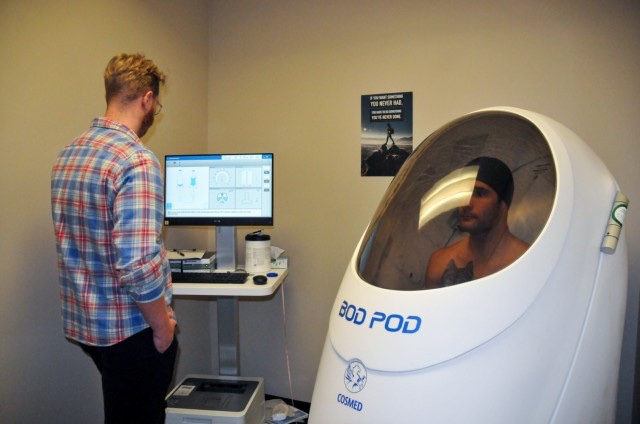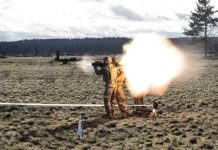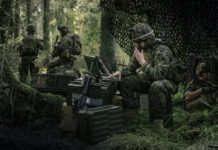
WASHINGTON — The Army rolled out its new Army Body Composition Program Monday that outlines a more accurate way to assess Soldiers’ body fat.
At a recent event, Sgt. Maj. Christopher P. Stevens, Army G-1 personnel sergeant major, and Holly McClung, lead researcher for the body composition study at the Army Research Institute of Environmental Medicine, talked about the roll out of the new program in detail.
“For years, we have been committed to reducing body fat across the force. It’s one of the driving factors in supporting the holistic health and fitness program, as well as one of the reasons to request a study on the Army Body Composition Program,” said Sgt. Maj. of the Army Michael A. Grinston in a prepared statement. “As we got feedback from the study, we found there were ways to modernize the ABCP and better uphold the standards established in the regulations. As we implement these policies, performance on the [Army Combat Fitness Test] will increase while body fat decreases at a scale never before seen in our Army.”
The new changes, which also apply to Army National Guard and Army Reserve, replace the older method of measurement with a one-site tape test that is one measurement across the belly button. The previous test had two measurements across the belly and the neck.
“This new tape test requires taping only at one site, and the use of a corresponding calculation model for all Soldiers,” Stevens said. “[The] height and weight screening table remains the first line of assessment so no change to that.”
“From the clinical application in the medical world, a waist circumference, abdominal around your belly button, is linked to long-term health outcomes,” McClung said. “Not only are we looking at the performance of the Soldier today, but the long-term health of the Soldier in years to come within the Army.”
As far as those who are unable to pass, the Army has methods in place that assist Soldiers with a path to a healthier lifestyle and, hopefully, will bring them up to standard.
“We want to help them, we want to put them on a health promotion track, work with some dietitians and some trainers and bring them up to standard,” McClung said. “It’s making sure that we’re helping our Soldiers today, as well as in the long run.”
With the older method, it was found that some Soldiers were passing when they should have failed, and some would fail when they should have passed, McClung said.
“That’s why as a team, the policy working group came up with the three different methods, so that we could pull out those top performers that maybe were failing,” McClung said.
Like the previous test, Soldiers who fail the height and weight will need to take the new standards test. Soldiers who fail the first taping method can use the previous taping method as confirmation until June 12, 2024, as the new method is phased in. After failing those tests, the Soldier will be flagged, which can negatively impact their career.
If the Soldier fails both of those versions of the tape test, they can request, if reasonably available, supplemental assessment with the Dual X-ray Absorptiometry, InBody 770 or Bod Pod. These three devices are an advanced way to measure body fat composition.
“What’s going to stay in place when it comes to profession in the Army Body Composition Program is weight loss,” Stevens said.
These changes were made based on extensive research. The Army-wide study, which the ABCP is based on, was completed earlier this year, and evaluated the effectiveness of the new test on more than 2,600 Soldiers.
“We were hearing a lot from Soldiers in listening sessions and other forums who were concerned with the ACFT,” McClung said. “One of the main outcomes of this study was the first time that the Army has actually linked physical performance to body composition.”
The Army will continue to use the data from the study to make modifications to the program if necessary.
“This new policy will increase the readiness of the force by giving every Soldier a more accurate assessment of their health and fitness,” Stevens said. “The overall focus of the program is to have an effective and accurate assessment of the holistic health and fitness of the force, while at the same time providing Soldiers with the resources they need to improve and preserve individual and unit readiness.”
By SFC Michael Reinsch, Army News Service
You can skip to the end and leave a response. Pinging is currently not allowed.








